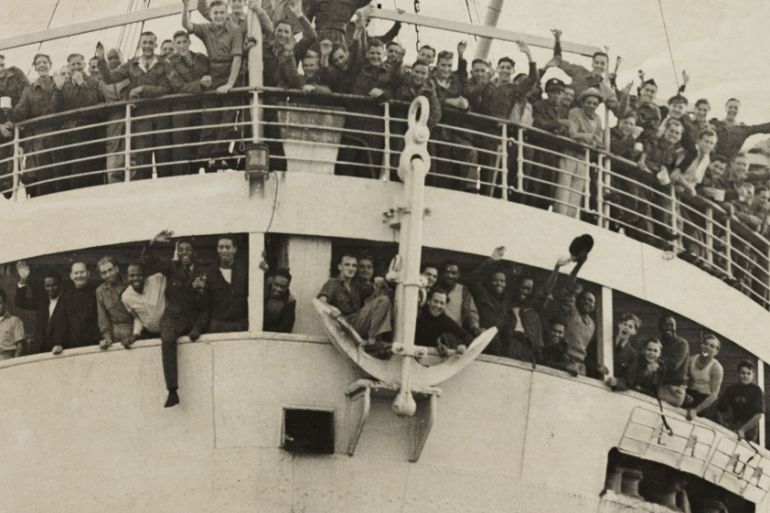How British imperial policies led to the Windrush scandal
Is it really that surprising that the UK government is mistreating the descendants of Caribbeans invited as labourers?

UK Prime Minister Theresa May‘s Commonwealth Summit has been overshadowed by a migration scandal that shows what her government really thinks of Commonwealth citizens. Inside the summit, British government ministers wine and dine their Commonwealth counterparts, hoping to secure trade and investment deals. Outside, that same government is trying to deport British residents from Commonwealth countries whose parents came here decades ago to help rebuild the country after World War II.
This scandal perfectly sums up the aspirations of so-called “global Britain”: to live off of the resources and labour of others, to oversee illegally earned capital flowing into the City of London from across the developing world and to firmly shut the door on anyone who deems him/herself worthy of living in this great land.
Keep reading
list of 4 itemsWhy South Africa’s opposition may struggle to unseat the ruling ANC
Georgia police break up protests against ‘foreign agents’ bill
Indian spies linked to killings, tracking dissidents abroad: What we know
First, the scandal: Many thousands of people came to post-war Britain at the invitation of the government of the day to answer a severe labour shortage. They were promised work and a home for their families. They’re known as the “Windrush generation” – named after the ship, the Empire Windrush, which brought the first wave of Caribbean migrants to Britain in 1948. Though they experienced severe racism upon arrival, the Windrush generation helped build the British economy, and, in time, a new British identity.
Despite arriving legally into the country, many of these people, along with their children, did not receive proper papers from the British authorities. In time, some found out that they are in fact “undocumented”. In fact, papers which could have helped them were destroyed, despite warnings by bureaucrats.
Under policies introduced by Theresa May when she was home secretary, many of the children of the Windrush migrants are finding themselves hounded by the government, thrown out of housing, jobs, healthcare provision and even facing deportation.
It’s called the “hostile environment” policy because it aims to make the lives of migrants without papers intolerable so that they “deport themselves”. And it does this by requiring more and more people in the British society to become, in effect, immigration enforcers. Schools, hospitals, employers, landlords, bank clerks, even driving instructors are increasingly required, by law, to ascertain immigration status. And it doesn’t take a genius to work out that ethnic minorities are going to be specially targeted by the new “enforcers”.
Some of the stories that have emerged in the media recently are sickening. Take Barbados-born Michael Braithwaite who arrived in Britain as a 9-year-old child in 1961, who has worked as a teaching assistant and has his family here. Under “routine” scrutiny from the school where he worked, he found he didn’t have the required evidence to prove his status, and at 66, he was sacked. Or Paulette Wilson who was a cook in the British House of Commons, but who was arrested in the infamous Yarl’s Wood removal centre and was almost deported.
This week, after even right-wing tabloids thought things have gone too far, the government was forced to apologise for the pain it has inflicted on people; “The Home Office has become too concerned with policy and strategy and sometimes loses sight of the individual,” UK home secretary Amber Rudd said. They’ve promised to speed up the process needed to guarantee the citizenship of Windrush children.
But of course, the bigger issue remains firmly in place. Although it’s being presented as accidental, in fact, none of this is an accident – it’s a deliberate policy to intimidate and harass. As Polly MacKenzie, a senior adviser to the former deputy prime minister, tweeted: “Theresa May’s mission was to make it systematically difficult to get by without papers.”
And the policy is made worse by breath-taking hypocrisy – government ministers make almost daily speeches about how outward-looking Britain will be after Brexit, how engagement with the world will continue, and how they will be international champions of free trade and borderless finance.
But then, so it has always been. In a debate on the Windrush scandal this week, Labour MP David Lammy pointed out: “The first ships in the Caribbean arrived in 1623. Despite slavery, despite colonisation, 25,000 Caribbeans served in the First World War and the Second World War alongside British troops.”
There is a history of slavery, of plunder and of pillage that precedes the shameful mistreatment of the Windrush generation. To this day, this neo-colonial legacy is embedded in British trade relationships with the world. It is the role of some countries to provide our basic goods, as cheaply as possible. It is the role of others to accrue the profits. Migrants are fine – they can be a useful source of cheap labour, as long as they have no rights, no ability to fight for a decent life.
Britain can only atone for this damage caused in the world by adopting policies exactly opposite to the ones currently in place. We must regulate big business and big money, to prevent displacement, exploitation and impoverishment of people across the world. And we must welcome the migrants who come to our country with open arms and not treat them as second-class citizens.
If the Commonwealth is to move away from its imperial origins, it must demand an end to such policies and refuse any trade deal which does not control capital and free people.
The views expressed in this article are the author’s own and do not necessarily reflect Al Jazeera’s editorial stance.
